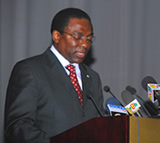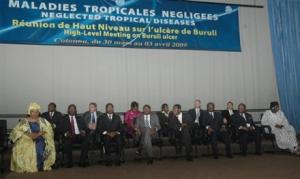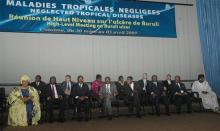Conference Adopts Cotonou Declaration on Buruli Ulcer

Cotonou, 1 April 2009 -- A one-day High-level Leadership Meeting on Buruli Ulcer(BU) organized by WHO and the Govenment of Benin in Cotonou on Monday (30 March) has adopted the Cotonou Declaration on Buruli Ulcer which commits BU-endemic counties to take a number of measures to prevent and control the disease.
This new declaration comes ten years after the historic conference in Yamoussoukro (Cote d’Ivoire) which adopted the Yamoussoukro Declaration on Buruli Ulcer.
The Cotonou meeting was attended by the Heads of State of Benin and Togo, the Vice President of Gabon, the Ministers of Health of Ghana, Nigeria and Cameroon, the Foreign Minister of Cote d’Ivoire and the WHO Regional Director for Africa.
Also in attendance were representatives of Foundations and NGOs like Raoul Follereau Foundation, Water for All Children-Africa, and ANESVAD -- all active in the area of BU prevention and control. Participants came from 32 countries: Australia, Belgium, Benin, Brazil, Cameroon, Canada, Central African Republic, Congo, Côte d’Ivoire, Democratic Republic of the Congo, France, French Guyana, Gabon, Germany, Ghana, Guinea, Italy, Kenya, Liberia, Luxembourg, Nigeria, the Netherlands, Norway, Sierra Leone, Spain, Sweden, Switzerland, Uganda, United Kingdom and United States of America.
The Cotonou Declaration commits endemic countries to take the necessary measures to:
- assess the magnitude of Buruli ulcer in countries;
- strengthen the case confirmation capacity of national laboratories in line with WHO recommendations;
- intensify, at all levels, education on Buruli ulcer especially in affected communities with a view to promoting early case detection;
- ensure that cases are detected at an early stage of the disease in order to reduce the frequency of disabilities;
- provide, for people affected by Buruli ulcer, access to specific antibiotic treatment, and surgical and rehabilitation services free of charge or at reduced cost;
- improve Buruli ulcer mapping and surveillance in affected countries and promote cross-border exchange of information;
- support research through active international cooperation on epidemiology, social and economic determinants and impact, prevention, development of new diagnostic tools and simplification of treatment with orally-administered medicines;
- mobilize additional resources for Buruli ulcer control;
- promote effective collaboration with other sectors to control the disease;
- promote social and economical rehabilitation of people adversely affected by the disease;
- strengthen further the primary health care system in affected areas in order to improve integration and implementation of control and disability prevention activities.
The Declaration calls on all the organizations of the United Nations system, bilateral and multilateral agencies, development banks, NGOs, foundations and research institutions to cooperate with endemic countries with view to making control interventions effective and accessible to all populations in need.
Opening the meeting, Benin President, Dr Boni Yayi, said that the Cotonou Declaration on Buruli Ulcer would serve as a guide to steps that should be taken by endemic countries in order to ensure the achievement of the common objective of preventing and controlling BU.
Addressing the meeting on behalf of WHO, the Organization’s Regional Director for Africa, Dr Luis Sambo, announced that based on the best available evidence, WHO’s new strategy for BU control will focus on early case detection and early
initiation of antibiotic treatment for patients.
This is because early treatment with antibiotics is vital to avoid the worsening of the disease during the delay between the time a case is detected and the onset of treatment.
BU, reported in 30 countries around the world, affects mostly poor, rural, tropical communities that live near water. The exact mode of BU disease transmission is still under investigation.
In the WHO African Region, BU has been confirmed in 12 countries - Benin, Cote
d’Ivoire, Republic of Congo, the Democratic Republic of Congo, Guinea, Ghana, Togo, Nigeria, Cameroon, Gabon, the Central African Republic and Uganda. Suspected cases have been reported in 10 others - Angola, Burkina Faso, Equatorial Guinea, Chad, Liberia, Sierra Leone, Mali, Malawi, Tanzania and Zambia.
For interviews, journalists covering the meeting may contact:
| Technical contacts: | Media contacts: | |
|
Dr Landry Bide E-mail: bidel [at] afro.who.int Tel: +47 241 39414 |
François Agossou E-mail: agossouf [at] bj.afro.who.int Tel : + 229 90-92-00-41 ou 97-29-02-54 |
|
|
Dr Tiendrebeogo Alexandre E-mail: tiendrebeogoa [at] cd.afro.who.int Tel: + 47241 30038 + 243 8127 71948 |
Sam Ajibola E-mail: ajibolas [at] afro.who.int
|




